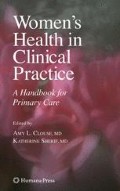Abstract
Functional gastrointestinal disorders are defined by symptoms because there are no specific disease markers available and there are no structural, mechanical, or biochemical abnormalities. These disorders are divided into seven categories based on anatomic location, as well as a pediatric grouping based on a consensus of experts (1) (Table 1). There can be significant overlap in these disorders in the same patient and the diagnosis is usually made by primary care physicians, gynecologists, and gastroenterologists (2). This chapter will focus on the Irritable Bowel Syndrome (IBS).
Access this chapter
Tax calculation will be finalised at checkout
Purchases are for personal use only
Preview
Unable to display preview. Download preview PDF.
References
Drossman DA (ed.). Rome II: The Functional Gastrointestinal Disorders. 2nd ed., 2000.
Chey WD, Olden K, Carter E, et al. Utility of the Rome I and II criteria for irritable bowel syndrome in U.S. women. Am J Gastroenterol 2002;97:2803–2811.
Camilleri M. Management of the irritable bowel syndrome. Gastroenterology 2001;120:652–668.
Olden KW. Diagnosis of the irritable bowel syndrome. Gastroenterology 2002;122:1701–1714.
Gonsalkorale WM, Houghton LA, Whorwell PJ. Hypnotherapy in irritable bowel syndrome: a large-scale audit of a clinical service with examination of factors influencing responsiveness. Am J Gastroenterol 2002;97:954–961.
Jones J, Boorman J, Cann P, et al. British Society of Gastroenterology guidelines for the management of the irritable bowel syndrome. Gut 2000;47(Suppl II):ii1–ii19.
Chang L, Heitkemper MM. Gender differences in irritable bowel syndrome. Gastroenterology 2002;123:1686–1701.
Ehrenpreis ED. Irritable bowel syndrome. 10–20% of older adults have symptoms consistent with diagnosis. Geriatrics 2005;60(1):25–28.
Taub E, Cuevas JL, Cook EW, et al. Irritable bowel syndrome defined by factor analysis gender and race comparisons. Digestive Diseases and Science 1995;40:2647–2655.
Sandler R. Epidemiology of irritable bowel syndrome in the United Stated. Gastroenterology 1990;99:409–415.
Camilleri M, Heading RC, Thompson WG. Consensus report: clinical perspectives, mechanisms, diagnosis and management of irritable bowel syndrome. Aliment Pharmacol Ther 2002;16:1407–1430.
Naliboff BD, Berman S, Chang L, et al. Sex-related difference sin IBS patients: central processing of visceral stimuli. Gastroenterology 2003;124:1738–1748.
Whitehead WE, Palsson O, Jones KR. Systematic review of the comorbidity of irritable bowel syndrome with other disorders: what are the causes and implications? Gastroenterology 2002;122:1140–1156.
Ji S, Park H, Lee D, et al. Post-infectious irritable bowel syndrome in patients with Shigella infection. J Gastroenterol Hepatol 2005;20:381–386.
Spiller RC. Neuropatholgy of IBS? Gastroenterology 2002;123:2144–2147.
Levy RL, Jones KR, Whitehead WE, et al. Irritable bowel syndrome in twins: heredity and social learning both contribute to etiology. Gastroenterology 2001;121:799–804.
Drossman DA. Irritable bowel syndrome: how far do you go in the workup? Gastroenterology 2001;121:1512–1515.
Williams RE, Hartmann KE, Sandler RS, et al. Recognition and treatment of irritable bowel syndrome among women with chronic pelvic pain. Am J Obstet Gynecol 2005;192:761–767.
Talley NJ. Unnecessary abdominal and back surgery in irritable bowel syndrome: time to stem the flood now? Gastroenterology 2004;126:1899–1903.
Heitkemper MM, Cain KC, Jarrett ME, et al. Symptoms across the menstrual cycle in women with irritable bowel syndrome. The American Journal of Gastroenterology 2003;98:420–430.
Talley NJ. Differentiating functional constipation from constipation-predominant irritable bowel syndrome:management implications. Rev Gastroenterol Disord 2005;5:1–9.
Chang L, Berman S, Mayer EA, et al. Brain responses to visceral and somatic stimuli in patients with irritable bowel syndrome with and without fibromyalgia. Am J Gastroenterol 2003;98:1354–1361.
Mertz HR. Irritable bowel syndrome. New Engl J Med 2003;349:2136–2146.
Longstreth GF, Yao JF. Irritable bowel syndrome and surgery: a multivariate analysis. Gastroenterology 2004;126:1665–1673.
Brandt LJ, Bjorkman D, Fennerty B, et al. Systematic review on the management of irritable bowel syndrome in North America. Am J Gastroenterol 2002;97(Suppl):S7–S26.
Sullivan MA, Snape WJ Jr. Colonic myoelectrical activity in irritable bowel syndrome. Effect of eating and anticholinergics. N Engl J Med 1978;298:878–883.
Clouse RE. Managing functional bowel disorders from the top down: lessons from a well-designed treatment trial. Gastroenterology 2003;125:249–252.
Palsson OS, Whitehead WE. The growing case for hypnosis as adjunctive therapy for functional gastrointestinal disorders. Gastroenterology 2002;123:2132–2135.
Bensoussan A, Talley NJ, Hing M, et al. Treatment of irritable bowel syndrome with Chinese herbal medicine. JAMA 1998;280:1585–1589.
Longstreth GF, Burchette RJ. Family practitioners’ attitudes and knowledge about irritable bowel syndrome: effect of a trial of physician education. Fam Pract 2003;20:670–674.
Grainek IM, Hays RD, Kilbourne A, et al. The impact of irritable bowel syndrome on health-related quality of life, Gastroenterology 2000;119:654–660.
Gore M, Frech F, Tai KS, et al. Burden of illness in patients with irritable bowel syndrome with constipation. Am J Gastroenterol 2003;98(Suppl):S219.
Longstreth GF, Wilson A, Knight K, et al. Irritable bowel syndrome, health care use, and costs: a U.S. managed care perspective. Am J Gastroenterol 2003;98:600–607.
Author information
Authors and Affiliations
Editor information
Editors and Affiliations
Rights and permissions
Copyright information
© 2008 Humana Press Inc., Totowa, NJ
About this chapter
Cite this chapter
Bethards, D.M., Ouyang, A. (2008). Irritable Bowel Syndrome. In: Clouse, A.L., Sherif, K. (eds) Women’s Health in Clinical Practice. Current Clinical Practice. Humana Press. https://doi.org/10.1007/978-1-59745-469-8_7
Download citation
DOI: https://doi.org/10.1007/978-1-59745-469-8_7
Publisher Name: Humana Press
Print ISBN: 978-1-58829-631-3
Online ISBN: 978-1-59745-469-8
eBook Packages: MedicineMedicine (R0)

